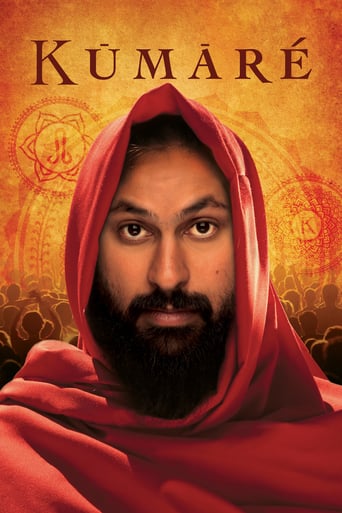Asma Alkaabi
Kumare is an extraordinary documentary. Vichram Ghandi (Kumare) has done such a great job directing as well as being the main character of this film. The questions that are being discussed in the documentary might have passed your thoughts before. Most people search for guidance in spiritual connections between them and God and the closest thing to that is a guru. Now I'm not sure if it's staged or not but Vichram is a genius for being able to handle such character. Each one of us has been in that phase of questioning our faith and I think it's important to watch documentaries that discuss such topics to reduce that sense of negligence in ourselves.
hte-trasme
It's said that Vikram Gandhi "impersonated" in Indian guru for this documentary but it seems like the deception he carried out was limited to speaking with an Indian accent rather than his own New Jersey one, wearing robes, and growing his hair and beard -- external elements that his disciples interpret in ways that vastly change their interpretations of the actual content of what he says. The film starts as a sort of practical expose of false gurus, and it never loses its power in that way -- these people are all very easily led to thinking they have had profound metaphysical experiences after speaking with a complete skeptic who merely looks and sounds like he could provide them with a metaphysical experience -- and who is telling them he's an illusion the whole time. If that's immoral at all, it's far less immoral than what is done by the countless "actual" gurus who seriously present supernatural claims and use them as a way into people's checkbooks. A key to the success of this film is Gandhi's performance in his "role" -- giving Kumare an innocence through his reactions and style of movement that endears him to the disciples while they are convinced of his wisdom. Without that their striking reactions could not have been captured. And it is remarkable when he realizes that he can make deeper connections with people and enjoy life more when he is playing Kumare than when he is not. There is an attempt to show that despite the earthly nature of his teachings, the students' lives have actually improved after their instruction with Kumare/Vikram. I'm not certain how I feel about that, but it's not a scientific claim, and amounts to saying that an admittedly-fake guru can help people as much or more than a supposedly- real one, and that they most needed to be told that they didn't need a guru. And that's fair.This is a fascinating experiment and a worthwhile documentary.
Zensha
So much irony in some of these comments here. Much to the contrary of what Kumare preaches, we seem to be quick at judging (more like guessing) others and their intentions, but never quite have the time to look into ourselves. Yes what he did wasn't the nicest thing and the initial goal he had in mind certainly wasn't to help anyone find himself. What I see is a somewhat brilliant young man looking for himself and searching for answers after being disappointed with all the fake gurus and superstition. He gradually finds out that Kumare is in fact his ideal self and that he is slowly becoming the real Kumare. He finds a deep connection with people as Kumare that Vikram has never experienced. He finds himself and sees the importance of helping others find themselves too. I didn't watch the movie with the intention to judge him. I watched it hoping to learn something from it, and I did. Watch it with an open mind, and it will touch your heart.
chex13
The definition of a guru being 'darkness into light' i.e. realisation of a truth should have given Vikram some pause for thought. His quest to spread a message that he believes to be true made him real guru, not a false one. The fact that he decided to be a guru seems to be his rationale behind being false, which makes no sense. The only way he would have been a false guru is if he had intentionally misled people, which he didn't. Indeed he connected better with people as Kumare than as Vikram.The entire premise defeats his own message. The fact that these people needed someone to tell them that they should be their own guru requires a guru for the message to be delivered. It is the same message as Buddhism, Sikhism and probably other eastern traditions. The only thing he demonstrated was the difference between a real guru and a false one. Ironically he was one of the real ones with a true message, once again, defeating his own aim. Something he didn't seem to realise at any point.


